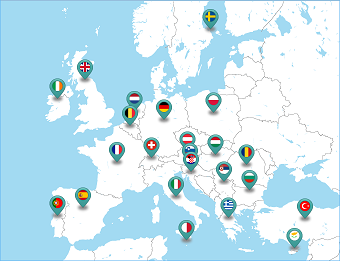ECRE analyses return practices as European Commission targets a doubling of current return rate
The European Council on Refugees and Exiles (ECRE) last week published a short but useful 4-page policy note looking at the voluntary and assisted return of third country nationals living irregularly in the EU.
 ECRE notes that the European Commission has recently announced that it wants to see the effective rate of returns double from 36.6% in 2017 to 70% by 2020.
ECRE notes that the European Commission has recently announced that it wants to see the effective rate of returns double from 36.6% in 2017 to 70% by 2020.
While ECRE acknowledges that return is a legitimate part of governments' migration policy, it argues that three pre-requisites must be in place:
- Fair and consistent asylum systems that properly assess whether a person is entitled to international protection;
- Fair and humane return procedures;
- Fair and transparent relations with third countries based on international human rights law and standards.
According to ECRE, the trend in EU states is for inducing returns with policies that use "sticks rather than carrots," including the threat of detention and withdrawal of rights such as employment and housing and other support. ECRE says that the use of such measures as a means of forcing individuals to cooperate with return procedures or compel them to leave of their own accord is unacceptable.
Amongst the policy note's recommendations, ECRE says that voluntary return is not possible for everyone and EU states need to provide dignified alternative solutions in the form of a status that provides basic socio-economic rights for those who cannot return.
The policy note concludes: "For ECRE, the test of an 'effective' voluntary departure should be the extent to which it enables individuals to lead a dignified and safe life in the country of return. Unfortunately, there seems to be little appetite to use a broader definition of effectiveness. This is short sighted as it means missing important information about what motivates people to return, why someone would choose voluntary departure, what would help them prepare, the effects on their communities, and whether they will be able to stay safely and in dignity without being forced to migrate again. Post-return monitoring is vital so that Member States learn more for future programmes as well as ensuring the safety of returnees. Different parts of the European Commission such as DG International Cooperation and Development can assist in supporting return communities. Longer-term development approaches have more chance of ensuring that returnees choose to remain in the country of return."
Earlier this year in February, the European Commission published a comprehensive 105-page report on the effectiveness of return procedures in EU states. The report is based on the contributions from 22 countries, including the UK.
The report focuses on the way the EU standards and procedures on return have been interpreted and applied at the national level and, to the extent possible, on how their application has impacted on the effectiveness of return.
It states: "This study aims at analysing the impact of EU rules on return – including the Return Directive and related case law from the Court of Justice of the European Union (CJEU) – on Member States' return policies and practices and hence on the effectiveness of return decisions issued across the EU. The study will present an estimation of the scale of the population of irregular migrants who have been issued a return decision but whose return to a third country has, as yet, not been carried out. The study will also seek to provide an overview of the challenges encountered by Member States in effectively implementing returns, as well as identify any good practices developed to ensure the enforcement of return obligations in full respect of fundamental rights, the dignity of the returnees and the principle of non-refoulement. Such challenges and good practices may cover national implementing measures or interpretations of concepts used under EU law (e.g. risk of absconding) or of the conditions to implement certain EU provisions, such as Article 15 of the Return Directive on detention. Conversely, the aim of the study is not to make an overall assessment of whether return policies in general are an effective instrument to manage or address migration – be it in the view of EU Member States, the countries of origin or the third-country nationals themselves. Although references to the Commission's 2017 Recommendation are made throughout the study, it does not aim to assess the implementation of the Recommendation by Member States."